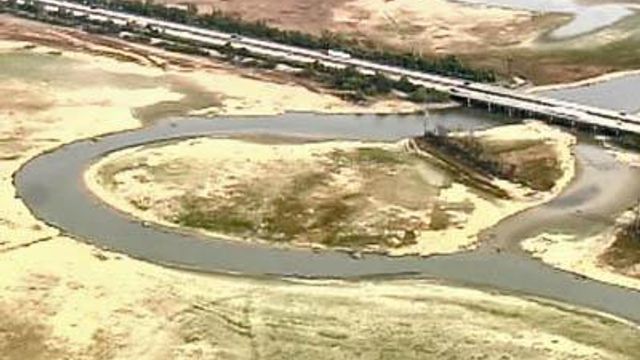State, Local Officials Push for Cuts in Water Demand
As Raleigh adopts tougher water restrictions and Gov. Mike Easley calls for people to halve their consumption, the region could see some widespread rain.
Posted — UpdatedBut Gov. Mike Easley said solving a water crisis is simple – cut consumption as much as possible.
"This is a lot simpler than it looks. I'm not saying it's easy, but it's simple," Easley said. "The individual user – you and me – if we can cut back significantly, then we've got this thing whipped."
More rain also would help, and WRAL Chief Meteorologist Greg Fishel said central North Carolina should see widespread rain in the coming days.
Rain should start falling after noon Wednesday and last through much of Thursday, Fishel said. By the weekend, many areas are likely to have received at least 1 inch of rain, and some spots might see 2 inches or more, he said.
Easley on Monday asked for everyone in North Carolina to reduce daily water consumption by half over the next week to get a sense of what would be required if the state reaches a crisis in the coming months and to see which solutions work in which areas.
The 17 water systems in near-crisis is almost triple the six in that category a week ago, said Woody Yonts, chairman of the North Carolina Drought Management Advisory Council. Another 80 of the state's 604 local water systems are vulnerable or being closely monitored by state officials, he said.
"We're going to probably have to start doing a better job of managing at the local level as far as recognizing the long-term needs," Yonts said. "Let's roll up the sleeves to move forward so we'll be ready."
Raleigh enacted tougher water restrictions Tuesday, outlawing sprinklers and personal car washing. First-time violators face a $200 fine, while a second violation brings a $1,000 fine and those who break the rules a third time will have their water turned off.
The so-called "Stage 1.5" restrictions are designed to eliminate the spikes in consumption seen in recent weeks on the two days each week when lawn watering was allowed. People still are allowed to water with a hand-held hose or watering can on one day each weekend.
More than half of North Carolina's 600-plus water systems have no restrictions for the 24 percent of the state's population that they serve. Even if they have adequate water supplies, Easley said, they should also limit consumption because the other parts of the state might need to tap into their reserves later.
"This is all new. There is no playbook for this, and it's going to take everybody participating," he said.
Raleigh resident Will Hooker, a horticulture science professor at North Carolina State University, is trying to do his part by capturing rainwater that runs off his roof and recycling water from his shower and kitchen sink to water the vegetable garden and fruit trees he uses to raise about 20 percent of the food he eats.
"We're trying to set an example. This is a sustainable living model," Hooker said. "Some people would say that it's extreme. I just think it's rationale. ... To me, this is what we need to do."
Falls Lake, Raleigh's primary reservoir, is about 8 feet below normal levels, and local officials are looking at ways to extend its capacity, from treating the sediment-heavy water at the bottom of the lake to pulling water from Lake Benson and Lake Wheeler.
Easley said such proposals and home conservations ideas should provide state officials with the blueprint they need to get a handle on managing water supplies statewide.
"If we run into water problems or run out and have to ration, it's our fault because we've got plenty of notice and we know what we've got to do," he said.
• Credits
Copyright 2024 by Capitol Broadcasting Company. All rights reserved. This material may not be published, broadcast, rewritten or redistributed.






